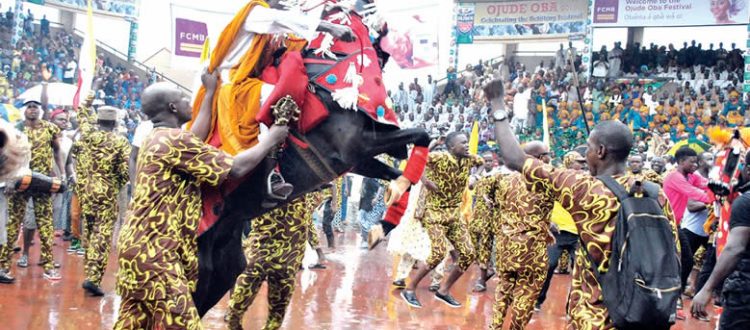OJUDE OBA CARNIVAL IN IJEBU-ODE
- Balogun Onafowokan Otubu -1890
- Balogun Odeyungbo Bello Kuku 1890 – 1907
- Balogun Abass Odejayi 1908 – 1915
- Balogun Adeyemi Sarunmi 1916 – 1925
- Balogun S.F Adesoye 1951 – 1961
- Balogun J.A Alatishe 1962 – 1995
- Balogun M.O Shote 1996 – 2001
- Balogun J.A.B Odunuga 2002 – 2016
- Balogun Agboola Alusa The current Balogun 2017
- Balogun Shote
- Balogun Kuku
- Balogun Alatishe
- Balogun Shoye
- Balogun Odejayi
- Balogun Otubu
- Josi Family
- Alatilehin Family
- Odedina Family
- Oreagba Family
- Shote Towobola Family
- Gamu Gaza Family
- Kasali Moyegeso Family
- Odidi Family
- Oshobe Family
- Aregbe Family
- Odedina Family.. amongst others
Furthermore, the beauty of Ojude Oba is not complete without the presence and role of the Regberegbe Age Groups. In the present circumstance, Ojude Oba has witnessed a tremendous transformation under the present Awujale and the the Paramount Ruler of Ijebuland, Oba S.K Adetona, JP, CFR Ogbagba ll. The festival haven witnessed a lot of innovations beyond the imagination of the forbearers now attracts a lot of goodwill in form of endorsement, support and sponsorship from Globacom, FCMB, Rites Food, Nigerian Distilleries, Council of Otunba, Ijebu Heritage, Age Groups, Clubs, high-networth sons & daughters at home & diaspora and other corporate organizations as part of their corporate social responsibilities (CSR) to the annual celebration of excellence.
However, with modernisation, the over 33 Regberegbe Age Groups with an average of 100 members each now add colours, pomp and pageantry to the celebration while showcasing the best and latest fashionsence as their inborn traditional and cultural heritage of excellence at the Palace Pavilion to receive traditional blessings from the Awujale. There is no gainsaying the fact that Kabiyesi’s motivation and encouragement has indeed turned the Regberegbe into a formidable vanguard for socio-economic development and advancement of Ijebuland. Moreover, their active involvement and participation has indeed become a unifying factor that creates an avenue for enduring peaceful, irrespective of the religious faith and social status of the members. Certainly, the spirit of tolerance, friendliness and accommodation generated by the annual Ojude Oba Carnival has contributed to the unity and peaceful co-existence among Ijebus in general.
In summary, there is no gainsaying the fact that, Ojude Oba Carnival has become a tradition and custom of the Ijebus as it now defines their identity, heritage, values and social behaviors. Infact, it is a unique carnival that has a cultural significance promoting the divine authority of the Awujale passed from generation to the other as a social inheritance of the Ijebus. Perhaps, one may add that the fashionsence as displayed by the Regberegbes is second to none in Yorubaland nay the nation at large reinforcing the general notion that: “If dressing well is wrong, the Ijebu man and woman can be right…”
End of discussion

